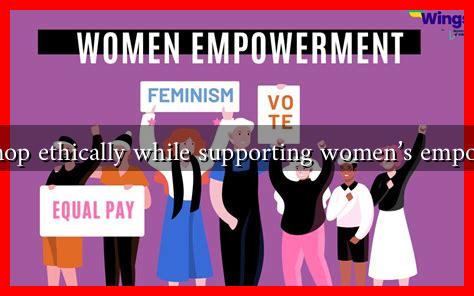-
Table of Contents
How to Shop Ethically While Supporting Women’s Empowerment
In today’s global marketplace, consumers are increasingly aware of the impact their purchasing decisions have on society. Shopping ethically not only supports sustainable practices but also plays a crucial role in empowering women around the world. This article explores how to shop ethically while championing women’s rights and economic independence.
The Importance of Ethical Shopping
Ethical shopping refers to the practice of purchasing goods and services that are produced in a manner that is socially responsible and environmentally sustainable. This approach to shopping is essential for several reasons:
- Promotes Fair Labor Practices: Ethical shopping often involves supporting brands that ensure fair wages and safe working conditions for their employees.
- Encourages Sustainable Practices: Many ethical brands prioritize eco-friendly materials and production methods, reducing their environmental footprint.
- Supports Local Economies: By choosing to buy from local artisans and businesses, consumers can help stimulate economic growth in their communities.
Empowering Women Through Ethical Shopping
Women make up a significant portion of the global workforce, particularly in developing countries. However, they often face systemic barriers that limit their economic opportunities. Ethical shopping can help dismantle these barriers by supporting women-led businesses and initiatives. Here are some ways to do this:
- Choose Women-Owned Brands: Look for companies that are owned and operated by women. Brands like Soko and Thistle Farms not only provide quality products but also empower women artisans and survivors of trafficking.
- Support Fair Trade Products: Fair Trade organizations ensure that women producers receive fair compensation for their work. Products like coffee, chocolate, and handicrafts from organizations such as Fair Trade International are excellent choices.
- Invest in Social Enterprises: Many social enterprises focus on empowering women through job training and education. Brands like 7ly provide opportunities for women in marginalized communities.
Case Studies: Successful Women Empowerment Initiatives
Several organizations and brands have successfully integrated women’s empowerment into their business models. Here are a few notable examples:
- Women for Women International: This organization provides women in conflict-affected countries with the skills and resources they need to rebuild their lives. By supporting their programs, consumers can help women gain financial independence.
- Warby Parker: For every pair of glasses sold, Warby Parker donates a pair to someone in need. Their partnership with women-led organizations helps empower women through education and job training.
- The Little Market: Co-founded by Lauren Conrad and Hannah Skvarla, this nonprofit shop features handmade products from women artisans around the world, ensuring fair wages and sustainable practices.
Tips for Ethical Shopping
To make a positive impact through your shopping habits, consider the following tips:
- Research Brands: Before making a purchase, investigate the brand’s practices regarding labor, sustainability, and community impact.
- Prioritize Quality Over Quantity: Invest in fewer, high-quality items that are ethically made rather than fast fashion products that contribute to exploitation.
- Engage with Your Community: Attend local markets or fairs that feature women-owned businesses and artisans.
Conclusion
Shopping ethically while supporting women’s empowerment is not just a trend; it is a movement towards a more equitable and sustainable world. By making informed choices, consumers can uplift women, promote fair labor practices, and contribute to a healthier planet. Remember, every purchase is a vote for the kind of world you want to live in. Choose wisely, and let your shopping habits reflect your values.

